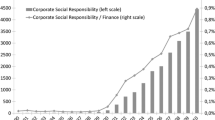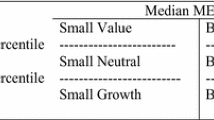Abstract
The ESG ratings have been focused in response to the requirements for green development. However, the uncertainty created by ESG disagreements has caused market participants to question their reliability. This study empirically examines how ESG disagreements affect stock price crash risk based on data from Shanghai and Shenzhen A-share listed companies. We find that ESG disagreement significantly reduces stock price crash risk and that this relationship is largely driven by environmental disagreement. The mechanism analysis suggests that ESG disagreement increases media attention, subsequently leading to a reduction in stock price crash risk. Additional analysis shows that the driving effect of environmental disagreement is more significant in non-heavy-polluting industries. Positive environmental protection policies help reduce stock price crash risk.
Similar content being viewed by others
References
An, Z., Chen, C., Naiker, V., & Wang, J. (2020). Does media coverage deter firms from withholding bad news? Evidence from stock price crash risk. Journal of Corporate Finance, 64, 101664.
Avramov, D., Cheng, S., Lioui, A., & Tarelli, A. (2022). Sustainable investing with ESG rating uncertainty. Journal of Financial Economics, 145(2), 642–664.
Bae, J., Yang, X., & Kim, M. I. (2021). ESG and stock price crash risk: Role of financial constraints. Asia-Pacific Journal of Financial Studies, 50(5), 556–581.
Berg, F., Koelbel, J. F., & Rigobon, R. (2022). Aggregate confusion: The divergence of ESG ratings. Review of Finance, 26(6), 1315–1344.
Blank, H., Sgambati, G., & Truelson, Z. (2016). Best practices in ESG investing. The Journal of Investing, 25(2), 103–112.
Boffo, R., Marshall, C., & Patalano, R. (2020). ESG investing: Environmental pillar scoring and reporting. Retrived, 14, 2021.
Bushee, B. J., Core, J. E., Guay, W., & Hamm, S. J. (2010). The role of the business press as an information intermediary. Journal of Accounting Research, 48(1), 1–19.
Capizzi, V., Gioia, E., Giudici, G., & Tenca, F. (2021). The divergence of ESG ratings: An analysis of Italian listed companies. Journal of Financial Management, Markets and Institutions, 9(02), 2150006.
Chatterji, A. K., Durand, R., Levine, D. I., & Touboul, S. (2016). Do ratings of firms converge? Implications for managers, investors and strategy researchers. Strategic Management Journal, 37(8), 1597–1614.
Chen, J., Hong, H., & Stein, J. C. (2001). Forecasting crashes: Trading volume, past returns, and conditional skewness in stock prices. Journal of Financial Economics, 61(3), 345–381.
Christensen, D. M., Serafeim, G., & Sikochi, A. (2022). Why is corporate virtue in the eye of the beholder? The case of ESG ratings. The Accounting Review, 97(1), 147–175.
Chu, G., Li, X., Shen, D., & Zhang, Y. (2021). Stock crashes and jumps reactions to information demand and supply: An intraday analysis. Asia-Pacific Financial Markets, 28, 397–427.
Clarkson, P. M., Fang, X., Li, Y., & Richardson, G. (2013). The relevance of environmental disclosures: Are such disclosures incrementally informative? Journal of Accounting and Public Policy, 32(5), 410–431.
Clarkson, P. M., Li, Y., Richardson, G. D., & Vasvari, F. P. (2011). Does it really pay to be green? Determinants and consequences of proactive environmental strategies. Journal of Accounting and Public Policy, 30(2), 122–144.
Coleman, L., Maheswaran, K., & Pinder, S. (2010). Narratives in managers’ corporate finance decisions. Accounting & Finance, 50(3), 605–633.
Cookson, J. A., & Niessner, M. (2020). Why don’t we agree? Evidence from a social network of investors. The Journal of Finance, 75(1), 173–228.
Cormier, D., & Gordon, I. M. (2001). An examination of social and environmental reporting strategies. Accounting, Auditing & Accountability Journal, 14(5), 587–617.
Cormier, D., & Magnan, M. (1999). Corporate environmental disclosure strategies: Determinants, costs and benefits. Journal of Accounting, Auditing & Finance, 14(4), 429–451.
Feng, J., Goodell, J. W., & Shen, D. (2022). ESG rating and stock price crash risk: Evidence from China. Finance Research Letters, 46, 102476.
Fiordelisi, F., Ricci, O., & Santilli, G. (2023). Environmental engagement and stock price crash risk: Evidence from the European banking industry. International Review of Financial Analysis, 88, 102689.
Gibson Brandon, R., Krueger, P., & Schmidt, P. S. (2021). ESG rating disagreement and stock returns. Financial Analysts Journal, 77(4), 104–127.
Hutton, A. P., Marcus, A. J., & Tehranian, H. (2009). Opaque financial reports, R2, and crash risk. Journal of Financial Economics, 94(1), 67–86.
Ioannou, I., & Serafeim, G. (2012). What drives corporate social performance? The role of nation-level institutions. Journal of International Business Studies, 43, 834–864.
Jin, L., & Myers, S. C. (2006). R2 around the world: New theory and new tests. Journal of Financial Economics, 79(2), 257–292.
Kim, J. B., Li, Y., & Zhang, L. (2011a). CFOs versus CEOs: Equity incentives and crashes. Journal of Financial Economics, 101(3), 713–730.
Kim, J. B., Li, Y., & Zhang, L. (2011b). Corporate tax avoidance and stock price crash risk: Firm-level analysis. Journal of Financial Economics, 100(3), 639–662.
Knox, S., Maklan, S., & French, P. (2005). Corporate social responsibility: Exploring stakeholder relationships and programme reporting across leading FTSE companies. Journal of Business Ethics, 61, 7–28.
Kotsantonis, S., & Serafeim, G. (2019). Four things no one will tell you about ESG data. Journal of Applied Corporate Finance, 31(2), 50–58.
Li, X., & Liu, B. (2021). The short-selling hypothesis of weekend effect and T+ 1 Trading mechanism. Asia-Pacific Financial Markets, 28, 1–19.
Li, X., Shen, D., & Zhang, W. (2018). Do Chinese internet stock message boards convey firm-specific information? Pacific-Basin Finance Journal, 49, 1–14.
Luo, D., Yan, J., & Yan, Q. (2023). The duality of ESG: Impact of ratings and disagreement on stock crash risk in China. Finance Research Letters, 58, 104479.
Petersen, C., & Plenborg, T. (2006). Voluntary disclosure and information asymmetry in Denmark. Journal of International Accounting, Auditing and Taxation, 15(2), 127–149.
Romer, D. (1993). Rational asset-price movements without news. The American Economic Review, 83(5), 1112–1130.
Scalet, S., & Kelly, T. F. (2010). CSR rating agencies: What is their global impact? Journal of Business Ethics, 94(1), 69–88.
Scholten, L., Van Knippenberg, D., Nijstad, B. A., & De Dreu, C. K. (2007). Motivated information processing and group decision-making: Effects of process accountability on information processing and decision quality. Journal of Experimental Social Psychology, 43(4), 539–552.
Serafeim, G., & Yoon, A. (2022). Stock price reactions to ESG news: The role of ESG ratings and disagreement. Review of Accounting Studies, 28, 1–31.
Shen, D., & Zhang, W. (2021). Stay-at-home stocks versus go-outside stocks: The impacts of COVID-19 on the Chinese stock market. Asia-Pacific Financial Markets, 28, 305–318.
Shroff, N., Sun, A. X., White, H. D., & Zhang, W. (2013). Voluntary disclosure and information asymmetry: Evidence from the 2005 securities offering reform. Journal of Accounting Research, 51(5), 1299–1345.
Tan, R., & Pan, L. (2023). ESG rating disagreement, external attention and stock return: Evidence from China. Economics Letters, 231, 111268.
Wang, C., Xiong, X., & Shen, D. (2022). Tail risks, firm characteristics, and stock returns. Pacific-Basin Finance Journal, 75, 101854.
Wang, J., Wang, S., Dong, M., & Wang, H. (2023). ESG rating disagreement and stock returns: Evidence from China. International Review of Financial Analysis, 91, 103043.
Widyawati, L. (2021). Measurement concerns and agreement of environmental social governance ratings. Accounting & Finance, 61, 1589–1623.
Yu, E. P. Y., Guo, C. Q., & Luu, B. V. (2018). Environmental, social and governance transparency and firm value. Business Strategy and the Environment, 27(7), 987–1004.
Zhang, Z., Su, Z., Wang, K., & Zhang, Y. (2022). Corporate environmental information disclosure and stock price crash risk: Evidence from Chinese listed heavily polluting companies. Energy Economics, 112, 106116.
Acknowledgements
This work is supported by Philosophy and Social Science Grant of Jiangsu Province, China under Research Project No. 2020SJZDA070 and the National Natural Science Foundation of China with Grant Numbers 72071109, 71901123, 72141304, 71532009.
Author information
Authors and Affiliations
Corresponding author
Additional information
Publisher's Note
Springer Nature remains neutral with regard to jurisdictional claims in published maps and institutional affiliations.
Appendix 1
Rights and permissions
Springer Nature or its licensor (e.g. a society or other partner) holds exclusive rights to this article under a publishing agreement with the author(s) or other rightsholder(s); author self-archiving of the accepted manuscript version of this article is solely governed by the terms of such publishing agreement and applicable law.
About this article
Cite this article
Dong, M., Li, M., Wang, H. et al. ESG Disagreement and Stock Price Crash Risk: Evidence from China. Asia-Pac Financ Markets (2024). https://doi.org/10.1007/s10690-024-09453-y
Accepted:
Published:
DOI: https://doi.org/10.1007/s10690-024-09453-y




